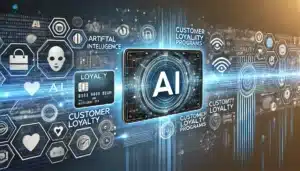Artificial intelligence (AI) has become the key driving force in transforming brand loyalty programs in the current fast-paced marketing environment. The inclusion of AI tools into these programs not only enriches customer experiences but also makes it easier to streamline brand management strategies. The article discusses the diverse role that AI plays in brand loyalty, where the use of AI technologies enables the engagement of customers with brands, personalizes the brand stories, and therefore changes the landscape of brand loyalty programs.
What is the Role of AI in Brand Loyalty Programs?
How Does AI Enhance Customer Engagement in Loyalty Programs?
AI plays an important role in improving customer engagement in loyalty programs by allowing brands to tailor experiences to individual preferences. By using predictive analytics and sentiment analysis, brands can gain insights into customer behavior and preferences. Using AI-driven analytics, brands can create personalized offers that resonate with customers, thus boosting engagement. For example, by analyzing a purchase history and engagement pattern, the algorithms will recommend related products or rewards, thereby showing appreciation to customers for their actions. It will strengthen the emotional attachment of a brand towards its consumers to foster lifelong loyalty.
What Algorithms are Used in AI-Driven Loyalty Programs?
Algorithms are used in AI loyalty programs for analyzing data and enhancing the experiences of customers. For instance, machines learn how to identify patterns in customer data to inform brand strategies. The algorithms can segment the customers based on their behaviors and preferences, creating opportunities for targeted marketing efforts. Reinforcement learning models, for their part, dynamically adjust rewards by considering their interactions with customers so that the loyalty program remains appealing and of interest. Such integration of such AI algorithms adds to enhancing customer satisfaction and improves brand perception by depicting the commitment of a brand in trying to understand its audience.
How is AI Changing Brand Identity in Loyalty Programs?
AI is revolutionizing the brand identity for loyalty programs by transforming the way brands communicate with their customers. The ability to gather and analyze vast amounts of data enables brands to form a more accurate and comprehensive understanding of their target audience. As brands embrace AI technologies, they can craft a more cohesive and relatable brand narrative that resonates with consumers’ values and preferences. This shift in brand identity fosters authenticity and trust, which are critical components of customer loyalty. In addition, brands that implement AI well are seen as innovative and future–oriented, thereby increasing market positioning.
How Can Brands Leverage AI for Increased Loyalty?
What Strategies Can Brands Use to Integrate AI?
In integrating AI into brand loyalty programs, brands must be very holistic in the data collection approach, analysis, and engagement strategy. The first area in which brands must invest in robust AI systems for the management and analysis of customer data is followed by utilizing AI tools for data cleaning and preprocessing. This would ensure high-quality data and decision-making. In developing their algorithms, brands should then focus on the design of algorithms to customize rewards in loyalty programs based on the customer‘s preference, which further increases personalization. Using AI in its brand strategy could better interact and enrich their engagement in a meaningful way, enabling consumer loyalty.
How Can Generative AI Improve Brand Positioning?
Generative AI changes the rules and might be beneficial for branding: developing and applying targeted and appropriate communication to achieve the message based on tailored or customized experiences for the targeted individual. For example, AI can create unique promotional materials based on customer data and preferences, ensuring that every piece of content is relevant and appealing. This level of customization not only enhances customer engagement but also strengthens brand loyalty by making consumers feel like they are part of a tailored experience. Through the use of generative AI, brands can present themselves as innovative leaders and gain a competitive advantage in retaining loyal customers.
What are the Best Practices for Using AI in Loyalty Programs?
Best practices for using AI in loyalty programs mean that brands must apply them by data collection and usage policies. These need to be transparent for their customers to feel secure concerning the information shared. Another vital aspect is the continuous assessment and improvement of AI models in tune with new market trends and changing consumer expectations. Brands also need to invest in continuous training for their teams on AI and machine learning developments. Finally, by encouraging an innovative culture where teams can experiment with new AI tools and methodologies, brands will be agile and responsive to the needs of consumers, thus making them more loyal to the brand.

What are the Implications of AI on the Future of Brand Loyalty?
How Will AI Change Customer Expectations in Loyalty Programs?
As AI becomes part of loyalty programs, customer expectations will change. Customers will come to expect more tailor-made experiences, instant rewards, and proactivity based on their preferences and behavior. Brands will then need to keep innovating within loyalty programs as a means to deliver those experiences. AI-based capabilities that help to process data in real-time ensure responsiveness to customer needs and enable an agile loyalty program. Consequently, brands that successfully adapt to these changes will strengthen customer loyalty and enhance their competitive edge in the market.
What Future Trends Can We Expect in AI and Brand Loyalty?
Looking ahead, several trends are likely to shape the intersection of AI and brand loyalty. The rise of AI-driven loyalty programs will lead to increased automation, reducing manual efforts in managing customer relationships. With ethical AI emerging, brands will also strive to ensure that ethical uses of data are implemented while consumers are free to have their personalized data allowing them to enjoy experiences with personalization. Lastly, social media platforms will be of increased use in analyzing various engagements and sentiments through AI while playing a larger role in helping brands refine their loyalty ideas. These trends will not only enhance brand loyalty but also redefine the ways brands communicate with their consumers in the digital age.
How Can Brands Prepare for the Future of AI in Loyalty Programs?
Brands must gear up proactively to prepare for the future of AI in loyalty programs. First, this means advancing data analytics capabilities and AI technologies that can be compatible in the future. Brands should build a flexible infrastructure that will enable the rapid integration of new AI tools and models into their business. Continuous learning and adaptation will be the way forward because their strategies need to be changed based on emerging trends and consumer feedback. It is, therefore, by embracing AI now and preparing for future developments that brands will ensure they remain relevant and competitive in the ever-evolving landscape of brand loyalty.
How Does Machine Learning Impact Brand Loyalty Initiatives?
What is the Relationship Between Machine Learning and Customer Retention?
Machine learning has a substantial influence on brand loyalty efforts since it makes the customer retention strategy more effective. Analysis of customers’ data leads to accurate predictions about which customers are likely to get disengaged and what is causing their dissatisfaction. With this, a brand will be able to be ahead of the curve on problem-solving, and it will help apply focused retention through personalized offers or customer service improvement. The brands are going to increase a loyal customer base using machine learning to enhance customer retention; the final product is long-term success.
How Can Brands Use Analytics from Machine Learning?
Brands can apply analytics from machine learning to inform the choices about loyalty programs. Thereby, they can better understand consumer behavior, preferences, and trends. They can tailor their loyalty offerings according to the customer’s needs when they have the power of analytics in advanced forms. In machine learning, for example, a brand can recognize high-value customers, but also determine what would make them return as valuable customers. Real-time analysis of the efficiency of loyalty initiatives allows brands to change their strategies in the process. This data-centric method not only makes the customer happier but also reinforces brand loyalty.
What Challenges Do Brands Face in Implementing Machine Learning?
Though there are benefits, brands face challenges in implementing machine learning in loyalty programs. Data integration coming from multiple sources can be challenging, and this complexity may act as a barrier to the application of machine learning models. What’s more, brands must be sure of possessing the right talent and resources to analyze and interpret the information effectively. Lastly, consumer data privacy and the violations of data protection regulations stand out as continuous undertakings that brands must deal with. All these factors make it imperative for brands seeking to successfully exploit machine learning in their loyalty programs.
How is Social Media and Digital Influencing AI in Brand Loyalty?
How Can Brands Use AI to Enhance Social Media Engagement?
Social media is an important channel for brands to enhance engagement and foster loyalty. By using AI, brands can analyze social media interactions to identify trends and customer sentiments. This analysis enables brands to create content that resonates with their audience, fostering a sense of community and connection. In addition, AI can automate responses from a customer to his question in social media, ensuring prompt engagement, and meeting expectations from a consumer. By leveraging AI within social media for loyalty programs, brands can more deeply engage with their customers in a relationship.
What Role Does Data from Digital Channels Play in AI Loyalty Programs?
Data from digital channels is key to the effectiveness of AI loyalty programs. The loyalty strategy can thus be informed by gaining insights from different digital touchpoints such as social media, websites, and mobile applications. This data encompasses all customer behaviors, preferences, and purchase patterns, and by analyzing them using AI technologies, brands will develop targeted marketing campaigns and personalized loyalty offers to improve customer experiences. As digital channel usage by brands increases, the importance of data integration into AI-based loyalty programs will become inevitable in achieving engagement and retention.



